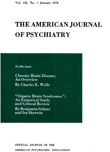UNDERSTANDING PSYCHOTHERAPY
Abstract
Psychotherapy is a planned and organized pattern of action designed to cure or alleviate a mental illness or a morbid emotional state. Psychotherapy shades off, by almost imperceptible degrees, into a great variety of efforts to use mental influences to assist patients in rehabilitation or in some amelioration of their distress or incapacity.
Attempts to explain psychotherapy have fallen in general into one of two contrasting patterns: ( 1) to learn about the noxious event or events that have happened to a person that caused a morbid emotional reaction, to discover the complex pattern that has maintained this morbid state, and to to the cause by insightful disclosure; or (2) to learn about the patient's bad patterns of reaction, and also about assets and potentialities and to evoke their constructive use in better handling of a crucially unresolved emotional problem or problems, significantly representative of the patient's morbid reaction pattern.
As between these two general modes of formulating and understanding psychotherapy, that which presumes to cure the psychogenic cause of the morbid reaction has readier acceptability and higher favor in our culture. It sells better. It implies higher expectations of radical cure. It also thereby lends itself to charlatan exploitation, deliberate or unconscious. As a sustaining aspiration, it has morale-building value, but as a description it is usually inaccurate and misleading, both to patient and practitioner.
The evocative formulation implies that the actual therapeutic potential is to be found and elicited in the patient, not applied by the psychotherapist. This is harder to believe, but more aptly descriptive, and teachable. Its chief shortcomings and dangers arise from lazy cynicism and superficial optimism.
Access content
To read the fulltext, please use one of the options below to sign in or purchase access.- Personal login
- Institutional Login
- Sign in via OpenAthens
- Register for access
-
Please login/register if you wish to pair your device and check access availability.
Not a subscriber?
PsychiatryOnline subscription options offer access to the DSM-5 library, books, journals, CME, and patient resources. This all-in-one virtual library provides psychiatrists and mental health professionals with key resources for diagnosis, treatment, research, and professional development.
Need more help? PsychiatryOnline Customer Service may be reached by emailing [email protected] or by calling 800-368-5777 (in the U.S.) or 703-907-7322 (outside the U.S.).



